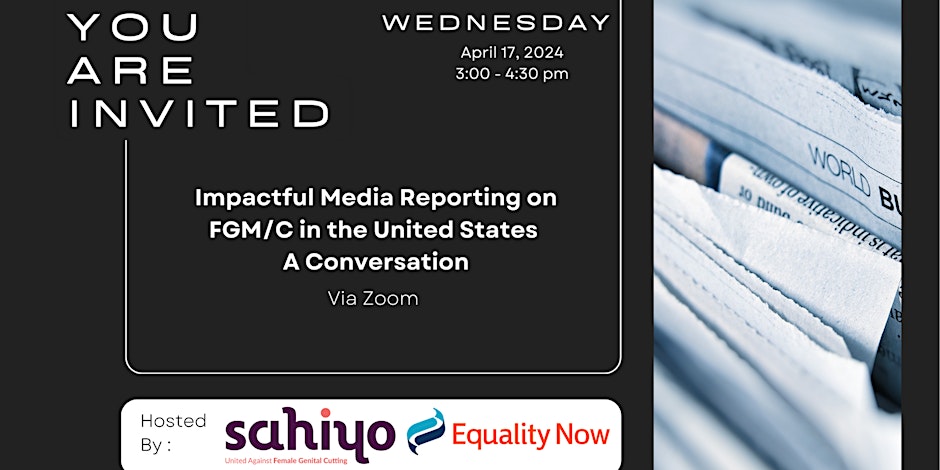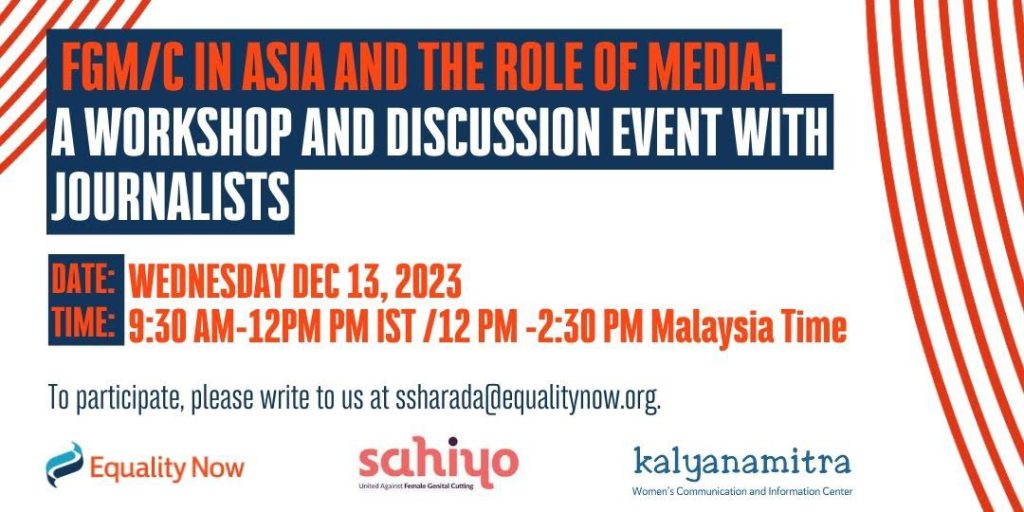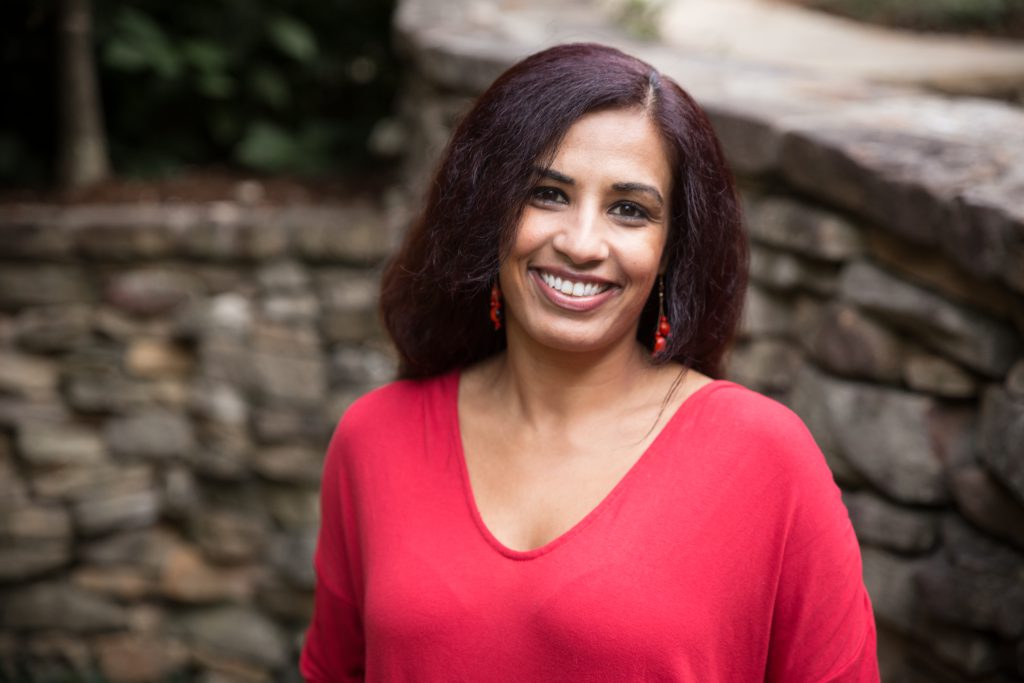Impactful Media Reporting on Female Genital Mutilation/Cutting in the United States: A Reflection on our April 17, 2024 Webinar
By Megan Seaver On April 17th, Sahiyo U.S and Equality Now had the honor of hosting a virtual event, “Impactful Media Reporting on Female Genital Mutilation/Cutting in the United States: A Conversation.” This webinar explored how to report on female genital mutilation/cutting (FGM/C) in a culturally cognizant, gender-sensitive, and ethical way. Attendees were media and communications professionals. Speakers included a panel of media and advocacy experts, such as: Washington State Senator Karen Kaiser, Emma Batha of Thomson Reuters Foundation News, Journalist Milena Mikael Debass, and documentary filmmaker Milena Warns from Without Exception Films. The moderators were Sahiyo Co-founder and U.S. Executive Director, Mariya Taher, and Equality Now Communications Officer for North America, Mel Bailey. Through this conversation, attendees were better able to understand the prevalence and complexity of FGM/C within the U.S. and the importance of engaging with survivors in a considerate manner when reporting on FGM/C. Additionally, attendees gained strategies on how to use media platforms to raise awareness and educate the public on FGM/C. They also learned analytical tools for covering related news, such as legal developments and community advocacy efforts effectively. Here are some highlights from webinar attendees: The importance of building relationships with survivors: “I can’t stress enough how important it is to build those contacts with survivors because that is how you get stories. When I meet advocates, or survivors I like to spend quite a lot of time with them, and meet them in person, because even if that interaction does not lead to a story you’re still increasing your knowledge which makes for better reporting and also builds trust so that the survivor or organization better understands what you as the report are seeking from the interaction” – Emma Batha The impact of a comprehensive approach and the role the media plays in it: “We are here to talk about media in all its forms and the roles that media can play when it comes to having a multi-sectoral approach to end FGM/C. Multi-sectoral means the collective effort of government agencies [and] local organizations, provides FGM/C education builds awareness, as well as support services for survivors at the federal, state, and local levels, to end FGM/C.” – Mariya Taher How media can tackle misinformation: “It takes a lot of education, and the media is a part of that process because people have a lot of misinformation. Unfortunately, we had to clarify that this practice is not religious practice… so it was somewhat of a difficult communications project and I have to give credit to the Washington coalition for providing first-person testimony to correct, and educate and to elucidate this issue.” – Senator Karen Kaiser On Survivor-led initiatives: “I wanted to write something that highlighted survivor-lead efforts to end the practice in the U.S. Figuring out how to show that work through videos took time, to build relationships, and how to make it visual. I had several conversations with Mariya, always kind of thinking about what types of work I could highlight. By the end, I was able to interview three survivor activists, but also film the Activist Retreat which is put on by Sahiyo in New York, [as well as help a D.C.survivors support group for African women, and a training for law enforcement on how to look for signs of FGM/C taking place in their community.” – Milena Mikael Debass Bring the issue of FGM/C to a wider audience: “We have a docu-series that focuses on different issues women face around the world and FGM/C is one of those. The one thing I keep coming back to is that we don’t give people enough credit. People want to learn about this, myself included. When we were going to film in different parts of the world, I spoke to my friends about this project and they wanted to know more about it. Then when we included the celebrity component we interviewed Constance Wu, an actress in Crazy Rich Asians who personally chose to discuss this topic because she personally wanted to learn about it.” – Milena Warns To learn more about this event, watch the recording below: [youtube url=”https://www.youtube.com/watch?v=oJsW0Ll024I”] Learn more about media communication/reporting on FGM/C with the resources below: Sahiyo survivor stories – Sahiyo Resource Guide for Sensitive and Effective Reporting on FGM/C – Sahiyo Global FGM media reporting toolkit – Equality Now US FGM media factsheet – Equality Now US FGM State Law Map – Equality Now
Upcoming Event: “Impactful Media Reporting on Female Genital Mutilation/Cutting in the United States: A Conversation”

Date: April 17, 2024 Time: 3:00 PM to 4:30 pm EST Registration: https://bit.ly/FGMCMediaReporting Join Equality Now and Sahiyo U.S. on Wednesday, April 17, 2024, at 3:00 PM EST, for a discussion that will explore the intricacies of reporting on female genital mutilation/cutting (FGM/C). This invitation extends to all media professionals — reporters, journalists, editors, and communication and content creators — who are looking to deepen their understanding and refine their approach to covering FGM/C. This event is particularly timely, given the current landscape where misinformation about FGM/C often leads to narratives that are uninformed, conflated, or misrepresented The Need for Nuanced Reporting: FGM/C is recognized as a human rights violation and poses unique reporting challenges. It is essential for media coverage to navigate these complexities with care in order to avoid inadvertently causing harm while staying true to the lived experiences of those impacted by FGM/C. This webinar seeks to address the topic by equipping attendees with the skills to report on FGM/C in a manner that is both sensitive and accurate. Who Will Be Speaking? The event will feature a panel of media and advocacy experts, including Senator Karen Kaiser, Emma Batha of Thomson Reuters Foundation News, journalist Milena Mikael Debass, and documentary filmmaker Milena Warns from Without Exception Films. The moderators of this event are Sahiyo Co-founder and U.S. executive director, Mariya Taher, and Equality Now Communications officer for North America, Mel Bailey. Attendees will gain insights on: The prevalence and complexity of FGM/C within diverse cultural contexts in the U.S. The importance of engaging with survivors or those at risk with informed sensitivity. Strategies for using media platforms to raise awareness and educate the public on FGM/C. Analytical tools for covering related news, such as legal developments and community advocacy efforts effectively. Why Attend? This webinar represents an opportunity for media professionals to contribute meaningfully to the discourse on FGM/C. Through informed reporting, the media can play a pivotal role in supporting survivors and educating the public. This event is not just about reporting on a sensitive topic; it’s about doing so in a way that respects the dignity of those impacted and contributes to positive change. If you’re involved in media or interested in how media and communications can influence social issues thoughtfully, this event is for you. It’s an opportunity to learn, ask questions, and consider the best practices for reporting on cultural practices that can lead to harm, such as FGM/C. Register for the event here
Upcoming Equality Now media training

On December 13th from 12-2:30 PM (Malaysia time), Sahiyo India is participating in a media training workshop with Equality Now and Kalyanamitra. The workshop’s aim is to sensitize journalists and media practitioners reporting on the prevalence of FGM/C in Asia in an effective way. The practice of FGM/C has been recorded in Asian countries such as Indonesia, Singapore, Maldives, Malaysia, the Philippines, Thailand, Brunei Darussalam, Sri Lanka, and India. Though widespread, the practice of FGM/C that occurs in Asia continues to receive little acknowledgement, and so does Asia as a region affected by the practice. This dissonance continues to be found in official statistics as well. For example, according to UNICEF, at least 200 million girls and women alive today and in 31 countries have undergone FGM/C. However, this does not represent the accurate picture as it is based only on data from nationally representative surveys. FGM/C is actually known to take place in at least 92 countries worldwide. (Orchid Project) This combined workshop and discussion event will present an overview of fundamental details about FGM/C in Asia. The discussion module will significantly help participants to better understand what constitutes ‘good’ or ‘bad’ FGM/C media coverage, how to ideate better and pitch more effective FGM/C-related pieces, and how to interact with and represent FGM/C survivors in Asia sensitively. Sahiyo India will be represented by Priya Goswami, a co-founder of Sahiyo as well as a co-founder and CEO of the Mumkin App, which aims to use technology to help survivors of gender-based violence. Priya is also the recipient of a National Film Award for her documentary ‘A Pinch of Skin,’ the first documentary from India to speak about the practice of FGM/C. Through the lens of a filmmaker and a communication designer, she will discuss safe and survivor-centric practices for depicting FGM/C. Please email us to receive the registration link for the session at info@sahiyo.org or to Shruti Sharada at Equality Now at ssharada@equalitynow.org.
Sahiyo featured in Align case study and webinar

After an ALIGN literature review revealed a lack of research on how broadcast media contributes positively to gender norm change, Faria A. Nasruddin has developed a series of case studies for the ALIGN platform that draw on the experiences from individuals and organisations in three key sectors: (1) education-entertainment, (2) commercial media, and (3) news media and journalism. Participating organisations include: Population Media Center, BBC Media Action, the Geena Davis Institute, the Representation Project, Sahiyo, Sancharika Samuha, and the Global Media Monitoring Project. These case studies, although varied, all revolve around the question: How can organisations mobilize broadcast media to effect positive gender norm change? What are the most effective strategies, and what are their results? To launch the case studies, ALIGN hosted a webinar with media practitioners, journalists, and researchers from South Asia to dialogue about the state of the South Asian media industry in terms of gender representation and how to tap into the transformative potential of broadcast media. Topics discussed varied from the effect of the #MeToo movement on the media industry to how to make education-entertainment engaging and effective. The diverse panel of speakers both highlighted the progress of those leading the way in changing the broadcast media industry and prompted key questions that the case studies address in greater depth.
Sahiyo in the Media
2024 Opinion: CT needs to ban female genital mutilation/cutting When Protecting Girls Is Twisted Into Attacking Trans Youth: FGM/C Survivors Fight Back Against Transphobic Right-Wing Narratives FGM in India: A Memoir of a Movement ‘Why didn’t my mother prevent it?’: healing the generational trauma of FGM Implementing Survivor-Led FGM Law In Washington State Activists See India as New Front in Fight Against Female Genital Mutilation 2023 Milken researchers receive grant for female genital mutilation prevention The film “The Beginning” laid the foundations of a new beginning in the interests of women Connecticut is 1 of 9 states without a ban on female genital mutilation. Thousands are at risk, activists say Cambridge woman honored for her work against the practice of female genital cutting L’Oréal Paris Inducts Ten Extraordinary Changemakers into Its Signature Philanthropic Initiative, Women of Worth Sahiyo Stories/Voices to End FGM/C Washington State introduces new law to protect women and girls from female genital mutilation or cutting Laws alone won’t end female genital mutilation in India: Mariya Taher 2022 What Can States Do to Address Female Genital Mutilation/Cutting in the U.S? 2021 This Kenyan Activist said No to ‘the Cut’ Training journalists in gender-sensitive reporting: Sahiyo. Sahiyo – a flame burning bright amid adversity Houston woman faces historic indictment over female genital cutting ‘So done with patriarchal control’ The right to be whole 2020 International day of zero tolerance against FGM: 27 short films break silence around khatna through personal storytelling These 27 short videos highlight the horrors of female genital mutilation Female genital mutilation is a chronic global problem. It demands a global response. 2019 Filmmaker Insia Tells Us How She Saved 4 Girls From Female Genital Cutting In 2019, Let’s Do Our Bit By Donating To These 7 Feminists NGOs “Don’t Mention It” Episode 2: Breaking The Silence: A Conversation with Mariya Taher Activists push for end to female genital mutilation FGC survivors share their stories to bring about change Female Genital Cutting: A Thousand Cuts That Start With One We must accelerate an end to FGM/C What I Learned from the Screening of Sahiyo Stories: Being Vulnerable and Learning How to Move On 2018 Global Citizen: The Truth About the Secretive Practise of FGM in Canada Survivor Herself, Mariya Taher Shares With Us Her Work To End Female Genital Cutting Is it a case of women against women in the movement to ban FGM? A Different Conversation on Female Genital Mutilation/Cutting Sahiyo Stories: Shattering the Silence on Female Genital Mutilation and Cutting 2017 The Bohra Women Fighting to End Female Genital Mutilation in India Mumbai Women’s group rallies support to end female genital mutilation by 2030 The Tipping Point: Can the World End Female Genital Mutilation/Cutting Through Her Lens, Filmmaker Priya Goswami Pictures The Story of Khatna In Bohris In Conversation With Film-Maker Priya Goswami – A Pinch of Skin In parts of Asia and Middle East, female genital mutilation a hidden ritual Breaking Isolation – Alerting the World About FGC Through Storytelling Female Genital Mutilation still a ‘global concern’ 65% ignorant of what has been cut: Khatna Survey Here’s What You Need To Know About The Global Fight To End Female Genital Mutilation Bohra doctor in Detroit arrested for alleged female genital mutilation of two seven-year-olds FGM among issues under focus at women’s conference Everything you need to know about ‘We The Women’ festival Muslim Women and the Challenge of Religion in Contemporary Mumbai We the Women: Horror on Female Genital Cutting Bohra women want an end to the practice of “female genital cutting”: Sahiyo report Sahiyo is India’s first collective against type of FGM called Khatna in the Dawoodi Bohra comunity. 2016 Fighting Female Genital Mutilation among India’s Bohra Sahiyo posted on Orchid Project website Wadi and Aware organize first ever conference on Female Genital Mutilation/Conference in Singapore Journalist opens up about ‘khatna’ among Bohras, campaigns against it Break the silence, stop female genital mutilation Bohra women speak out against Female genital mutilation, launch petition Lifting the veil of silence: Speaking out against Female Genital Mutilation Shocking! 80% of Bohra women have been subjected to Female Genital Mutilation: Survey Dawoodi Bohra women are seeking to end the practice of female genital mutilation Building a movement around Khatna Women in Maharashtra unite in fight against female genital mutilation The Changemakers: Women from across India show others what it takes to say no to injustice. Sahiyo’s Mariya Taher: Empowering Muslim Women through Storytelling panel World’s Dark Secret – Radio Interview Khatna: FGM in the global Dawoodi Bohra community Sahiyo: Empowering Dawoodi Bohra Communities & Putting An End to Female Genital Cutting Clarify on circumcision, Bohras appeal to Syedna Legal notice a big worry for Bohras standing up to ‘khatna’ Rebecca Coombes: Beware the medicalisation of female genital cutting A rebellion inside a small Indian sect seeks to end a brutal custom: female genital mutilation Underground: American Who Underwent Female Genital Mutilation Comes Forward to Help Others End Female Circumcision: Dawoodi Bohra women Say Na to Khatna Strength in Unity Only 1 in 10 who underwent FGM want it done on daughters Interview with Mariya Taher from Sahiyo: Reflections on her Experience at the TTC Not just a small nick: Priya Goswami’s second film raises an even louder voice against FGM No More Khatna: Meet the Five Women Standing against the Ritual of Female Circumcision in India Female Genital Cutting in India: Women and Men Come Together to Share Their Stories of Khatna Mariya Taher & Insia Dariwala Interview at the End Violence Against Girls: Summit on FGM/C at the U.S. Institute of Peace on Dec 2n, 2016 Voices of Resistance Against Female Genital Mutilation in India Grow Louder Showcasing Sahiyo – I Am Bohra Anti-FGM photo campaign Sahiyo: An Organization Dedicated to Ending Female Genital Cutting in Asia and Beyond
Texas woman charged for Female Genital Cutting: Sahiyo press statement

A woman from Houston, Texas (USA) has been charged under federal United States’ law for transporting a minor out of the country for the purpose of Female Genital Mutilation/Cutting (FGM/C). According to the Federal Bureau of Investigation (FBI) which is investigating this case, the 39-year-old woman allegedly transported the child sometime between July 10 to October 14, 2016. This is the first time that the US Department of Justice has indicted anyone under this specific clause of the US anti-FGM/C law, i.e, transporting a minor girl outside of US borders to facilitate the practice of genital cutting. While FGM/C has been illegal in the United States since 1996, this clause was introduced in 2013. The FBI is investigating the case with the support of the Human Rights Violators and War Crimes Center, a government agency that works to identify, locate and prosecute human rights abusers in the US. While further details about this case are awaited, it is important to note that the Houston woman has not been charged under the new federal anti-FGM/C law that was signed by the US President on January 5. Since the alleged crime took place in 2016, she has been charged under section 116(d) of the older federal law against FGM/C. The older federal law has been the subject of controversy since April 2017, when two Michigan doctors and six other members of the Dawoodi Bohra community became the first people to be prosecuted for performing/facilitating FGM/C on at least nine minor girls in the Michigan area. In November 2018, even though a US District Court judge acknowledged that FGM/C was a “despicable” practice, he ruled that the federal law prohibiting it was unconstitutional. This ruling was based on a technicality: the judge stated that FGM/C is considered a “local criminal activity” to be looked into at the state level rather than the federal or national level. The ruling triggered a controversy because it placed girls in the US at the risk of being cut. Only 39 out of 50 US states currently have laws prohibiting FGM/C, allowing room for girls to be transported across state borders to be subjected to the practice. The new “Stop FGM Act of 2020”, signed by the government this month, closes this loophole and allows federal authorities to prosecute people suspected of carrying out FGC anywhere in the country. Sahiyo statement: We at Sahiyo have been advocating for a complete end to the harmful practice of Female Genital Cutting, also known as Khatna or Khafz in the Dawoodi Bohra community, since 2015. FGC is a violation of the rights and bodily integrity of women and girls, and can have long-term physical, psychological and sexual consequences for them. In light of this indictment of the Houston woman, we strongly urge members of all FGC-practicing communities to completely abandon this age-old ritual, not just because it is illegal in the US and several other countries, but because it is harmful, patriarchal, medically unnecessary, and detrimental to the well-being of girls and women. At the same time, we also urge all global media publications to report on this case — and on the subject of FGC — with sensitivity and nuance. We request the media to refrain from vilifying specific communities, or using terms such as “barbaric” or “mutilation” that might trigger a survivor’s trauma. To learn more, check out Sahiyo’s Guide: A Resource Guide To Best Practice For Sensitive and Effective Reporting on FGM/C. For more information, email info@sahiyo.com or to contact Sahiyo U.S., email mariya@sahiyo.com.
Digital advocacy: The future of activism for survivors and activists

by Sandra Yu Activism is the policy or action of using vigorous campaigning to bring about political or social change. Prior to Sahiyo, I thought to be an activist was to be loud. Anything less than protests and demonstrations picketing for change outside the White House was not really activism. Actionable change came from legislation and policy changes. I scoffed at digital activism – trending hashtags and posting black squares on Instagram didn’t mean you were an activist. At Sahiyo as a programs intern, I gained a new appreciation for storytelling and digital advocacy as forms of healing and activism, respectively. In contrast to the physical mobilization of masses in protests, picketing, and policy-based activism, storytelling is a distinctly emotional and psychological mobilization. I remember watching my first Voices to End Female Genital Mutilation/Cutting (FGM/C) video – Change by Rhobi Samwelly. She shared her story in the short span of 3 minutes and 51 seconds, and in that short period of time, I felt as if I had visualized her pain, trauma, and conviction to end FGM/C. It is through storytelling that one will understand the need for activism; the picketing will come later. Storytelling is particularly impactful in activism against FGM/C. As a harmful and pervasive social norm in many cultures, FGM/C is silently maintained across generations under the guise of cultural normativity. To break the culture of silence is to risk ostracization from their families and communities. Yet, many survivors have taken that plunge and have engaged in storytelling to protect future women from being cut. As allies, it is our job to amplify their stories so that more people may hear them and become inspired to create change. I recently attended a webinar that spoke about how we can best amplify voices through digital advocacy. Digital Storytelling and Advocacy: How Stories Can Support Progressive Change was hosted by StoryCenter and moderated by Amy Hill; one of Sahiyo’s co-founders, Mariya Taher, presented on the Voices campaign as a panelist. In the webinar, Amy speaks about the need for storytelling as an avenue of advocacy. She presents research on how telling and listening to stories can increase self-esteem and wellbeing, help communities bond and become politicized, and inspire people to take action for change. I translate that as storytelling allows for transformation. It allows survivors and community members to transform the trauma of FGM/C on their bodies and mental health into a point of connection with others of the same community. Across activist communities, storytelling allows for a transformation from discomfort to vulnerability. Isabel, another intern at Sahiyo, wrote about her experience with StoryCenter and Sahiyo’s co-hosted webinar, Intersecting Stories, where she engaged in intimate storytelling that glimpsed into “the magical nature of storytelling – how words weave friendships, trust, and respect.” I believe storytelling has a way of transcending the individual to bind communities together through shared values and experiences. In the current age of digitization, we see stories framed in a variety of mediums such as Instagram, Twitter, and Facebook. While it may be easy to get lost in trends, hashtags, and stories in digital activism, I find that digital advocacy is equally powerful as traditional media in allowing us to amplify the voices and stories of survivors. The process of connecting people and communities across the world through a screen is an important concept to develop. I’m proud to be a part of an organization that creates change through digital advocacy and storytelling.
How female genital cutting is portrayed in television series

By Hunter Kessous Female genital cutting (FGC) is an international human rights violation and a form of gender-based violence. As the public becomes increasingly aware of this harmful practice, survivors of FGC are being portrayed in media and pop culture. FGC involves the partial or total removal of external female genitalia or other injuries for non-medical reasons. Producers of Orange is the New Black (OITNB), Call the Midwife, and The Good Doctor have incorporated FGC into their storylines. Warning: spoilers ahead! Orange is the New Black Season 7, Episodes 9 and 10 OITNB’s most compelling season brought in Shani, an asylum seeker from Egypt. While in the detention center, she becomes intimate with an inmate, Niky. When their sex life begins to struggle, Shani opens up to Niky about the FGC she underwent at 11 years old. Her mother said she needed to get rid of a bug, a common justification for FGC that girls hear around the world. There are many aspects of Niky’s story that real-life survivors of FGC share. I was very impressed with the writers of OITNB for addressing the struggle with sexuality that FGC survivors face. FGC comes with a multitude of psychological impacts which harm survivors’ emotional and sexual functioning. Yet, too little attention is given to these consequences. Even research is lacking in this area. Niky does an excellent job of portraying how partners of FGC survivors should react. Niky researches alternative ways to make Shani feel good that don’t involve clitoral stimulation. In their next sexual encounter, Niky ensures Shani is relaxed and moves slowly. When pain arises, Niky stops immediately and promises that they will keep communicating until they find what works. The relationship between Niky and Shani is truly heart-warming. The actress who played Shani, Marie-Lou Nahhas, is a Lebanese American anti-FGC activist, who traveled with the UNFPA to meet with FGC survivors in Ethiopia, and uses her social media platforms to share information on FGC. Nahhas recently hosted the launch of Farzana Doctor’s newest novel, Seven, about women’s relationships, marriage, infidelity, religion, tradition, and sensitively exposes the practice of khatna or FGC among the Dawoodi Bohra community. Call the Midwife Season 6, Episode 6Te Call the Midwife painted the story of a pregnant woman, Nadifa, from Somaliland in the 1960s in England. At a young age, she was infibulated, meaning her outer labia were sewn together in order to form a seal, which narrows the vaginal opening. Like Shani, Nadifa thought what had happened to her was typical. The doctor and midwives had never seen FGC before, but handled her case graciously. When Nadifa went into labor, the midwife realized the panic she was experiencing was a result of a flashback to having been cut, and helped calm her. Mental health consequences are another component of FGC that are rarely discussed. Nadifa gave birth en-route to the hospital, and the midwife had to cut her open in the ambulance. The day after her baby was born, Nadifa’s little sister was sent back to Somaliland by her mother’s orders to be cut. The midwives were enraged at this news and asked Nadifa how she could allow her sister to be held down and cut by a man, the same procedure that could have killed her. Nadifa informs the midwives, to their shock, that it is a woman, not a man, who performs FGC. She says her sister must be cut to ensure she is respected, clean, and able to find a good husband. The reasons Nadifa gave for her sister to undergo FGC are common justifications in many communities around the world. The midwives are unable to prevent Nadifa’s sister from leaving, as her boat for Somaliland leaves before they can reach her. The redeeming factor of this sad ending is that Nadifa decides not to allow her own daughter to be cut. The Good Doctor Season 2, Episode 2 In this episode of The Good Doctor, a patient named Asha goes to the emergency room seeking vaginal rejuvenation. She says at the age of two she was tied down and cut. According to a research study on FGC, for survivors who sought reconstructive surgery, repairing the visual stigma of their genitals was a major motivator. Asha, whose real name is Mara, is of African ancestry, but her story highlights that FGC is occurring in the U.S. The surgeons create an elaborate plan to make her an outpatient so she can be home at the end of the school day. The plan goes awry when Mara awakes from surgery in pain. This signals that she has nerves that may be used to reconstruct the clitoris. Her parents and surgeon argue over whether Mara should undergo the reconstructive surgery or have the remaining nerves killed. The safer option would leave Mara permanently unable to experience clitoral stimulation. Mara chooses not to undergo the reconstruction. The surgeon awakes her once more without her parents present and tries to convince her to undergo the clitoral reconstruction. The surgeon goes ahead and performs the clitoral reconstruction without Mara’s consent. When Mara wakes up and realizes what happened, she thanks the surgeon. For the second time in her life, Mara’s body was altered without her consent. For many FGC survivors, this would be psychologically distressing. Another major flaw we see in this episode, is that the doctor repeatedly calls FGC “butchering.” This language is very harmful and is demeaning to communities that practice FGC. This word choice is alienating, and can promote discrimination and reinforce stereotypes. Language such as this is counterproductive to the movement to abandon FGC. Overall, I was very impressed with the portrayal of FGC in these TV shows. FGC is a complex issue, and I was happy to see facets such as sexuality, mental health, culture and treatment being addressed. When I embarked on this project, I was preparing myself for stereotypes and myths. Fortunately, this wasn’t the case. In fact, some common misconceptions were addressed. I believe the media
Crave Foundation recognizes Sahiyo co-founder Mariya Taher as 2020 grantee

by Jenny Cordle The Crave Foundation for Women selected Sahiyo co-founder Mariya Taher as one of their inaugural recipients for an individual grant in recognition for her work to end female genital cutting (FGC) in Asian communities and beyond. In 2015, she co-founded Sahiyo – United Against Female Genital Cutting, an award-winning, transnational organization with the mission to empower Asian communities to end FGC. She is one of five 2020 grantees. The Crave Foundation acknowledges that “pleasure is a universal human right that can not be fully realized where there is injustice and violence against women.” The foundation recognizes individuals who are working in the gender-based violence areas of female genital cutting and sex trafficking. Their model is unique in that they provide no-strings-attached grants so that grantees can utilize the grants in the most appropriate way they see fit. “That is incredibly rare, and I’m brimming with ideas now on how to use these funds to further my work to both support survivors and prevent future generations of girls from undergoing FGC,” Taher said, who is a survivor of FGC. Taher’s work at Sahiyo focuses on storytelling programs and creating a critical mass of voices against FGC to “create a culture in which survivors can heal by connecting” to work toward creating a society where FGC no longer occurs. “I’m constantly learning and adapting my work and Sahiyo programs to fit the needs of both survivors and the communities they belong to in which FGC occurs,” Taher said. “For myself, from the very beginning, I started engaging in anti-gender-based violence work because I had both lived experiences with gender-based violence, and also knew so many other individuals who also had experiences of some form of gender-based violence, whether it was female genital cutting, domestic violence, or sexual assault. I understood how both culture, society, and even one’s family could play a part in perpetuating environments in which violence occurred, and I wanted to learn how to undo that violence.” In addition to her work at Sahiyo, Taher collaborates with the Massachusetts Women’s Bar Association on passing state legislation to criminalize FGC; an endeavor in which FGC activists and lawmakers had two victories when the Massachusetts House of Representatives and the Senate recently passed bill H.4606 – An Act Relative to the Penalties for the Crime of Female Genital Mutilation. The bill is now on Governor Charlie Baker’s desk to be signed into law. Taher also creates community education and outreach programs within the state on this issue. Taher serves on the steering committee for the U.S. End FGM/C Network. In 2018, Taher received the Human Rights Storytellers Award from the Muslim American Leadership Alliance. The Manhattan Young Democrats honored her as a 2017 Engendering Progress honoree, and ABC News did a special feature on her, entitled: Underground: American Woman Who Underwent Female Genital Mutilation Comes Forward to Help Others. Taher has worked in the gender-based violence field for over a decade in the areas of teaching, research, policy, program development, and direct service. She has worked at Saheli, Support and Friendship for South Asian Women & Families, W.O.M.A.N., Inc., Asian Women’s Shelter, San Francisco Department on the Status of Women, San Francisco State University, and was a 2014 Women’s Policy Institute Fellow through the Women’s Foundation of California. During her journey as an advocate, she has learned that change takes time. “We all want change to happen quickly – particularly on issues in which violence is connected to children – but being an advocate teaches you that change is slow,” Taher said. “It doesn’t mean you won’t feel frustrated, and that there won’t be days when you want to just give up. Change will come. Every time I hear a survivor share her story out loud or learn someone has forgone having the practice done on their daughter – even each time that I learn an individual is joining this line of work because they want to make a difference, shows me that change is occurring and people care. All those examples give me hope, and it’s why I keep at this work.” Sahiyo co-founders include Aarefa Johari, Priya Goswami, and Insia Dariwala.
Massachusetts Senate passes FGM/C bill

BOSTON, MA – July 30, 2020 – Sahiyo would like to thank the President of the Massachusetts Senate, Karen Spilka, and bill sponsor Senator Joe Boncore (D-First Suffolk and Middlesex) for the passage of bill H4606 “An Act Relative to the Penalties for the crime of Female Genital Mutilation/Cutting (FGM/C)” in Massachusetts. The FGM/C bill had a favorable vote in a formal session of the Senate, after it passed in the House on July 16th. Governor Charlie Baker will have 10 days to sign the bill. Survivors Mariya Taher, an Anonymous survivor, and activist Hanna Stern created a change.org petition to plead with the Massachusetts state legislature to protect young girls in Massachusetts from being cut by making FGM/C illegal. Taher, in particular, was praised by Senator Boncore for her work and advocacy on the issue. Taher has worked with the Women’s Bar Association of Massachusetts independently, and on behalf of Sahiyo – United Against Female Genital Cutting, of which she is the U.S. Executive Director and co-founder. Senator Boncore also recognized Sahiyo for their work on advocating for the abandonment of FGM/C. A member of the legislative working group, Joanne Golden, is also a member of the U.S. Advisory Board for Sahiyo. On June 16th, the Massachusetts House of Representatives voted favorably to pass the bill. The FGM/C bill not only has bipartisan support, but also bicameral support, with over 100 Senate and House cosigners of the original bills (H3332, H1466). The bill has also been supported by almost 50 organizations, including The Women’s Bar Association of Massachusetts, the AHA Foundation, UNICEF USA, the U.S. End FGM/C Network, Boston Mayor’s Office of Women’s Advancement, Office of the Child Advocate, Caucus of Women Legislators, American Academy of Pediatrics – Massachusetts Chapter, and American Congress of Obstetricians and Gynecologists (ACOG) – Massachusetts section, and Sahiyo, to name only a few. FGM/C is defined by the World Health Organization as removal of all or part of a girl’s healthy genitals and surrounding tissue for non-medical reasons, often resulting in serious health consequences, including the risk of death in childbirth, and lifelong trauma. There are no health benefits to this practice. According to the Centers for Disease Control, half a million women and girls living in the U.S. have been cut or are at risk of FGM/C. Over fourteen thousand such women and girls reside in Massachusetts, which ranks as 12th in the nation for at-risk populations. Last session, the Joint Judiciary Committee heard unequivocal testimony from survivors that FGM/C happens in the U.S., and that girls born in Massachusetts are at risk. Thirty-eight states have already passed laws banning FGM/C, including during the shutdown for the COVID-19 pandemic, and we respectfully urge Governor Baker to sign bill H4606 into law so that Massachusetts can become number 39. In November 2019, a U.S. District court struck down the federal law making FGM/C illegal, finding that Congress exceeded its authority under the U.S. constitution, and that FGM/C is a violent crime that must be regulated by the states. Top Massachusetts law enforcement officials testified last September that existing state criminal laws would not cover FGM/C. The Department of Children and Families considers FGM/C a form of child abuse. Massachusetts must act to stop this practice. Thank you to Senate President Spilka and House Speaker DeLeo, and our House and Senate bill sponsors for your leadership, support, and action on such an important issue of women and girl child rights.
